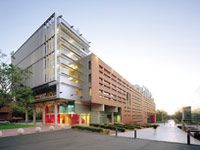Telecommunications - TELEAH3762
Stream Summary
Faculty: ENG - Faculty of Engineering
School: School of Electrical Eng and Telecommunications
Contact: School
Program: 3762 - AdvSci(Hons)/Engineering(Hons)
Award(s):
Bachelor of Engineering (Honours) (Major)
View stream information for previous years
Stream Outline
The undergraduate curricula are being progressively revised to provide flexible training to suit the future needs of students. Individual student needs can be further met by substitution provisions within the programs.
Stream Structure
Year 1
Choose ONE of:
- MATH1131 Mathematics 1A (6 UOC)
- MATH1141 Higher Mathematics 1A (6 UOC)
- MATH1231 Mathematics 1B (6 UOC)
- MATH1241 Higher Mathematics 1B (6 UOC)
- PHYS1121 Physics 1A (6 UOC)
- PHYS1131 Higher Physics 1A (6 UOC)
- COMP1911 Computing 1A (6 UOC)
- COMP1917 Computing 1 (6 UOC)
- ENGG1000 Engineering Design (6 UOC)
- PHYS1231 Higher Physics 1B (6 UOC)
Suggested Year 1 electives for this program are:
- COMP1921 Computing 1B (6 UOC)
- ELEC1111 Elec & Telecomm Eng (6 UOC)
- ENGG1811 is an acceptable alternative for COMP1911
- Students wishing to take further computing after 1st year should take both COMP1917 and COMP1927.
- Not all courses are offered in both semesters but students should complete 24 UOC in each semester.
- COMP1921 Computing 1B (6 UOC)
- COMP1927 Computing 2 (6 UOC)
- ELEC1111 Elec & Telecomm Eng (6 UOC)
- ELEC2133 Analogue Electronics (6 UOC)
- ELEC2134 Circuits and Signals (6 UOC)
- ELEC2141 Digital Circuit Design (6 UOC)
- MATH2069 Mathematics 2A (6 UOC)
- MATH2099 Mathematics 2B (6 UOC)
- ELEC2142 Embedded Systems Design (6 UOC)
- ELEC3104 Digital Signal Processing (6 UOC)
- ELEC3106 Electronics (6 UOC)
- ELEC3114 Control Systems (6 UOC)
- ELEC3115 Electromagnetic Engineering (6 UOC)
- ELEC3117 Electrical Engineering Design (6 UOC)
- TELE3113 Analogue and Digital Comms (6 UOC)
When undertaking the stream as a part of a single BE degree program in Telecommunications, the program consists of the Telecommunications stream plus 12 UOC general education plus 12 UOC foundational or disciplinary electives.
Similarly, when ELEC1111 and COMP1921 are chosen as the L1 electives in Year 1, an additional 12 UOC foundational or disciplinary electives are taken in Year 4.
The foundational or disciplinary electives may be chosen from the following lists:
Foundational (L3) Electives
- COMP3211 Computer Architecture (6 UOC)
- COMP3231 Operating Systems (6 UOC)
- ELEC2146 EE Modelling & Simulation (6 UOC)
- ELEC3145 Real Time Instrumentation (6 UOC)
- ELEC4601 Digital & Embedded Syst Design (6 UOC)
- ELEC4602 Microelectronic Design & Tech (6 UOC)
- ELEC4603 Solid State Electronics (6 UOC)
- ELEC4604 RF Electronics (6 UOC)
- MATH3101 Computational Mathematics (6 UOC)
- MATH3121 Mathematical Methods (6 UOC)
- MATH3161 Optimization (6 UOC)
- MATH3201 Dynamical Systems and Chaos (6 UOC)
- MATH3261 Fluids, Oceans & Climate (6 UOC)
- MATH3411 Information, Codes and Ciphers (6 UOC)
- TELE3113 Analogue and Digital Comms (6 UOC)
- TELE3118 Network Technologies (6 UOC)
- TELE3119 Trusted Networks (6 UOC)
Microelectronics
- ELEC4611 Power System Equipment (6 UOC)
- ELEC4612 Power System Analysis (6 UOC)
- ELEC4613 Electrical Drive Systems (6 UOC)
- ELEC4614 Power Electronics (6 UOC)
- ELEC4617 Power System Protection (6 UOC)
- PHTN4661 Optical Circuits and Fibres (6 UOC)
- PHTN4662 Photonic Networks (6 UOC)
Industrial Experience Requirements
Students are required to submit a written report on their industry placements, typically 2000-3000 words, describing the organisation of the Company, summarising the work done and the training received. The report must be accompanied by certification of their industrial placement by a senior company representative.
Industrial Training will be assessed as a compulsory part of the course ELEC4122 Strategic Leadership and Ethics. Students must complete the industrial training requirement in order to receive a completed assessment for this course, but the industrial training assessment does not affect the mark received for ELEC4122.
To suit the special abilities or needs of individual students a limited number of course substitutions are permitted within each program. Any such substitution must have prior approval of the Head of School.
- Substitution is not normally permitted if it unduly restricts the range of courses studied to only one area of specialisation.
- Progression to ‘next level’ courses is not permitted without satisfying the nominated pre-requisites.
- In the case of a concurrent degree program, accreditation of any course in more than one program is not permitted.
- Prior School consent is required for any accredited substitution. This includes any courses taken from other schools at the student’s own initiative.
- Substitution is not normally permitted in the first two years of the program.
- Substitution of one postgraduate course within the School is permitted, provided a similar course is not offered at the undergraduate level.
- Student exchanges are permitted, and students are encouraged to organise their exchange in the second semester of their third year in order to simplify the process of accrediting substitutions.
The School's L3 and L4 elective lists provide the breadth and the depth required for an Electrical, Telecommunications and Photonic Engineering Degree. These electives are provided from the six disciplines within the School. In addition, L3 electives include courses from other Schools. Students must have completed at least 36 units of credit of Year 4 core and L4 elective courses in order to satisfy the requirements for graduation. Therefore students should choose their L3 and L4 electives accordingly.
Note: Students are not permitted to count more than 60 units of credit (excluding the 12 units of credit of general education courses) of Year 1 courses toward the degree, as the required breadth and depth of the Electrical/Telecom/Photonics engineering program would not be obtained otherwise.
Transfer from Other Programs/Advanced Standing Students/Mid-Year Entry
The introduction of year 1 (L1), year 3 (L3) and year 4 (L4) electives accommodates students who are transferring from another program, are advanced standing or are in mid-year entry, as it allows them to complete required number of units of credit within the stipulated time of the normal program.









